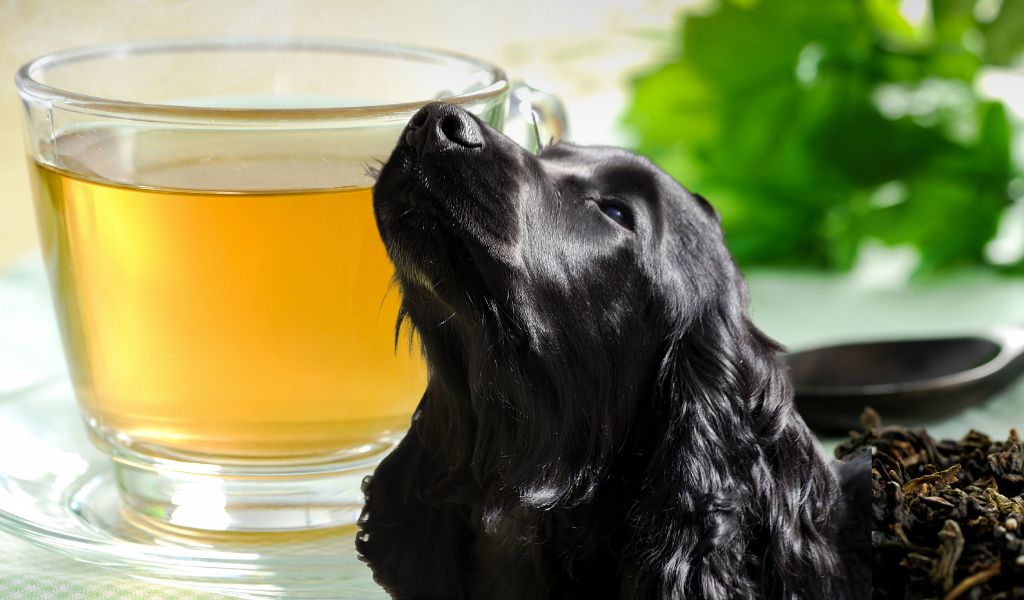Many dog owners are interested in giving their dogs green tea, but are not sure of the benefits or if it is safe.
In this blog post, we will explore the benefits of green tea for dogs and address any concerns you may have about feeding your dog this beverage.
Green tea has many potential health benefits for dogs, including improved metabolism and brain function. However, it is important to check with your veterinarian before giving your dog green tea, as some breeds are more sensitive to caffeine than others. Furthermore, be sure to choose an organic, plain variety of green tea to avoid any harmful sugar or flavourings.
Green tea and dogs
Green tea is made from the Camellia sinensis plant and has many health benefits for humans, including improved brain function and a lower risk of cancer.
Certain antioxidants and nutrients in green tea may also be beneficial for dogs.
For example, the catechins in green tea can boost a dog’s metabolism and fight bacteria.
Green tea also contains L-theanine, an amino acid that can promote relaxation without drowsiness.
The benefits of green tea for dogs
Green tea is rich in antioxidants, which are substances that can neutralize harmful molecules in the body known as free radicals.
Free radicals are linked with cell damage and inflammation, both of which can contribute to a variety of health problems.
By reducing the amount of free radicals in the body, green tea may help to reduce the risk of some chronic diseases.
In addition to its antioxidant content, green tea also contains polyphenols, which are plant-based compounds with a variety of potential health benefits.
One type of polyphenol found in green tea is known as catechins, which have been linked with lower blood pressure and improved cholesterol levels in humans.
Catechins may also help to protect cells from damage and boost the immune system.

Green tea and digestion
One of the main benefits of green tea for dogs is that it can help with digestion.
Just like people, dogs can sometimes suffer from digestive issues like gas, bloating, and diarrhea.
The natural antioxidants in green tea can help to soothe an upset stomach and keep things moving along smoothly.
If your dog is struggling with digestive issues, green tea may be able to help.
Green tea and allergies
Another benefit of green tea for dogs is that it can help to relieve allergies.
Seasonal allergies are fairly common in dogs, and they can cause a whole host of problems like runny eyes, sneezing, and itchiness.
Some studies have shown that the antioxidants in green tea can help to reduce histamine levels in the body, which may lead to fewer allergy symptoms.
If your dog is suffering from seasonal allergies, green tea may be worth a try.
Green tea and overall health
In addition to helping with specific health problems like digestion and allergies, green tea can also help to improve your dog’s overall health.
Green tea is packed with antioxidants and nutrients that can boost immunity, improve brain function, and even fight cancer cells.
Adding green tea to your dog’s diet is a great way to give their health a boost.
Are there any risks?
While green tea generally has many health benefits, there are some risks to consider before giving it to your dog.
The main concern is the caffeine content in green tea.
It’s important to note that dogs metabolize caffeine differently than humans do, so it’s possible for them to experience adverse side effects from consuming too much caffeine.
Too much caffeine can cause restlessness, heart palpitations, and vomiting in dogs
For this reason, it’s best to give your dog decaffeinated green tea or limit their intake of caffeinated tea to small amounts.
You should also avoid giving your dog green tea if they are pregnant or nursing.
If you have any concerns about giving your dog green tea, be sure to talk to your veterinarian first.
Final Words
Green tea is a healthy drink that can offer a variety of benefits for dogs.
From improving digestion to relieving allergies, green tea can be a helpful addition to your dog’s diet.
Just be sure to give your dog decaffeinated green tea and only in small amounts.
Choose an organic, plain variety and, as always, if you have concerns then always talk to your vet.










